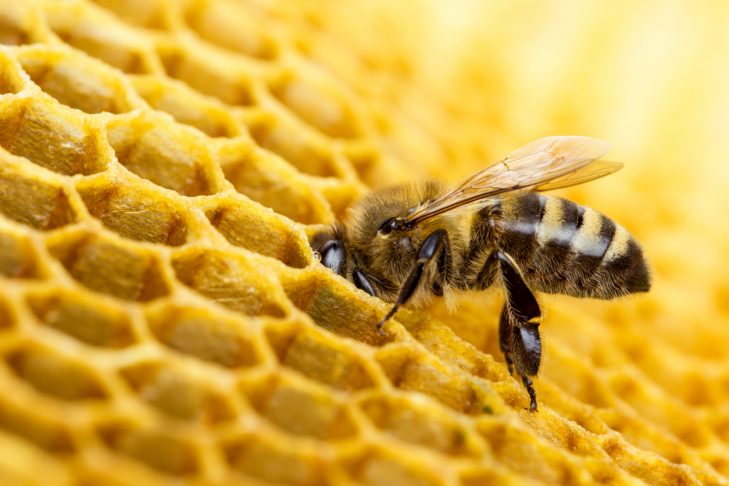Honeybees are integral to the much-loved Jewish New Year ritual of apples and honey. From the first sign of a sore throat to delectable desserts, to teas, even to cosmetic and medicinal usage, the sweet amber nectar has many other treasured applications that nearly everyone enjoys.
But due to the use of agricultural chemicals, honeybee populations have been in rapid decline over the past decade. A Massachusetts legislator is trying to do something about it, at least in our state.
According to a staff person at the office of Massachusetts Rep. Carolyn C. Dykema (D-8th Middlesex), Bill H.4041, An Act to Protect Massachusetts Pollinators, is currently moving through the legislature. It is now sitting in the House Committee on Ways and Means, which has until July 31 to act.
In November 2017, the bill was reported favorably out of the Joint Committee on Environment, Natural Resources and Agriculture.
With 134 co-sponsors from both parties and both chambers of the legislature, a letter of support for the current version, with 111 signees, was recently sent to the chair of Ways and Means.
H.4041, introduced by Dykema in 2016, would limit the use of the pesticides neonicotinoids, known generally as neonics. Exposed and disoriented bees tend to either carry the toxin back to the hive, or to fail to return altogether. The result is a devastating phenomena called Colony Collapse Disorder.
According to the Natural Resources Defense Council document “Vanishing Bees,” Colony Collapse Disorder was first identified in 2006. A sobering 2014 National Geographic report by Sasha Ingber found that the number of U.S. honeybee colonies had been halved over the previous 10 years. And it has only gotten worse since.
In 2016, I reported for the Jewish Journal on a “Sweet New Year Beekeeping & Havdalah” event at Temple Beth Shalom of Peabody. There, biologist and Massachusetts State Bee Inspector Anita Deeley showed children an actual hive, taught them how to identify honeybees and spot the queen, and discussed their role as pollinators of both flowers and agriculture—including the fruits, nuts and veggies, even the coffee—we love.
“We rely on bees and other pollinators not just for honey, but for one-third of our food supply,” said Dykema in an email this week.
For those who enjoy honey, and who might also empathize with the sometimes stinging but always invaluable honeybee, the situation is particularly worrisome. According to pestworldforkids.org’s “Facts About Bees,” honeybees account for only a small fraction of the approximately 20,000 known species of the flying insect. And over their entire lifetimes, approximately eight honeybees will only produce a single teaspoon of the beloved stuff.
Dykema’s office is hopeful that the bill will soon come to the floor for a vote. The office said it appreciates the support the bill has received from various public groups, as well as from a large grassroots organizing movement.
“The broad support for this legislation reflects the urgent need for common-sense solutions to protect pollinator health,” said Dykema in her email.
Alternatives to neonics include breeding predatory insects to take care of agricultural pests naturally, a process utilized by the Israeli company BioBee.
But change comes slowly. Although gardening supply giant Home Depot announced in May 2016 that it would phase out neonicotinoids, it did not do so until this year. Lowe’s plans to follow suit in 2019, and the Environmental Protection Agency’s public comment period only just ended in April, with final pollinator risk assessments for these chemicals due to be released mid-year.
Local environmental groups might wish to contact Dykema’s office as soon as possible. A July surge of support could help H.4041 become law, so that by this September, those slices of honeyed apple might taste even sweeter.
This post has been contributed by a third party. The opinions, facts and any media content are presented solely by the author, and JewishBoston assumes no responsibility for them. Want to add your voice to the conversation? Publish your own post here. MORE



